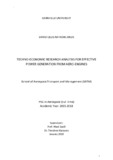JavaScript is disabled for your browser. Some features of this site may not work without it.
| dc.contributor.advisor | Savill, Mark A. | |
| dc.contributor.advisor | Kipouros, Timoleon | |
| dc.contributor.author | Rowlands, David Olusina | |
| dc.date.accessioned | 2023-01-18T09:37:07Z | |
| dc.date.available | 2023-01-18T09:37:07Z | |
| dc.date.issued | 2019-01 | |
| dc.identifier.uri | https://dspace.lib.cranfield.ac.uk/handle/1826/18971 | |
| dc.description.abstract | This research focuses on the techno-economic assessment of Brayton cycles and provides a platform through which the evaluation and optimization of gas turbine engine performance and economics may be achieved in an economical and cost effective way. In this study, a techno-economic analysis model has been developed which takes into account technical, environmental and economic variables during analysis in order to arrive at reasonable solutions for gas turbine system optimization from a technical and economic perspective, and in a viable and cost effective way. The model integrates elements of machine learning, regression analysis, economics, thermodynamic and optimization analysis into a cohesive whole to enable robust techno-economic investigation. In order to provide a baseline for the research analysis and investigation, a case study engine model similar to the Tumansky-R25-300 turbojet engine is created. This engine choice seeks to provide an alternative, profitable civil use for the grounded jet engines owned by the Nigerian Air force. A study is conducted using the developed techno-economic methodology to determine the feasibility, from a performance and economic perspective, of repurposing the selected case study engine into an aero-derivative engine for electrical power generation application. At ISA conditions, burning natural gas, the repurposed engine model (REM) delivers 18.52MW of power at 33.5% thermal efficiency. With respect to the case, study environment, Nigeria (Tropical region), at an average altitude of 700m, the repurposed engine model delivers 17.66MW of Power at 31.6% thermal efficiency. Repurposing the power plants of the considered grounded aircrafts has the potential to consolidate electrical generating capacity in Nigeria by about 8% in simple cycle and 10% in combined cycle applications. Techno-economic analysis conducted on the repurposed engine model reveals that investment in the REM over a 15years planning horizon would break even at 5years with 22% return on investment (ROI) in simple cycle and 19% ROI in combined cycle application. In simple cycle, the REM deliver a NPV of $24.21 million at a levelized cost of energy, LCOE, of 0.155$/MWh and investment base of $18.24 million. In combined cycle investigations, the REM delivers a NPV of $23.98 million at an LCOE of 0.121$/MWh and investment base of $20.85 million in combined cycle. Performance and economic optimization analysis conducted on the repurposed engine model achieved a 39% reduction in fuel flow, 39% reduction in NOᵪ emission generated and about 30% decrease in LCOE from baseline values while maintaining positive profitability. Based on the techno-economic analysis conducted, assumptions made and results obtained from this study, it is feasible, from a performance and economic perspective, to apply the repurposed engine model (REM) for electrical power generation, both within and outside the considered case study region with minimal loss in performance output and economic profitability. Further investigations reveal that the repurposed engine model (REM) can favourably compete, from a performance and economic perspective, with some of the competitor units considered in this study. A techno-economic cost modelling and analysis tool based on the developed technoeconomic analysis methodology has been developed and integrated with TURBOMATCH performance simulation software. The integration of the tool with TURBOMATCH has extended its potential application scope to cover numerous areas including preliminary design investigation, technology comparison, power cycling analysis, project selection from alternatives, capital budgeting problems, novel cycle investigations, life cycle cost analysis and sensitivity analysis. | en_UK |
| dc.language.iso | en | en_UK |
| dc.rights | © Cranfield University, 2015. All rights reserved. No part of this publication may be reproduced without the written permission of the copyright holder. | |
| dc.subject | techno-economic | en_UK |
| dc.subject | gas turbine engine performance | en_UK |
| dc.subject | gas turbine system optimization | en_UK |
| dc.subject | machine learning | en_UK |
| dc.subject | regression analysis | en_UK |
| dc.subject | thermodynamic | en_UK |
| dc.title | Techno-economic research analysis for effective power generation from aero-engines. | en_UK |
| dc.type | Thesis | en_UK |
| dc.description.coursename | PhD in Aerospace | en_UK |
